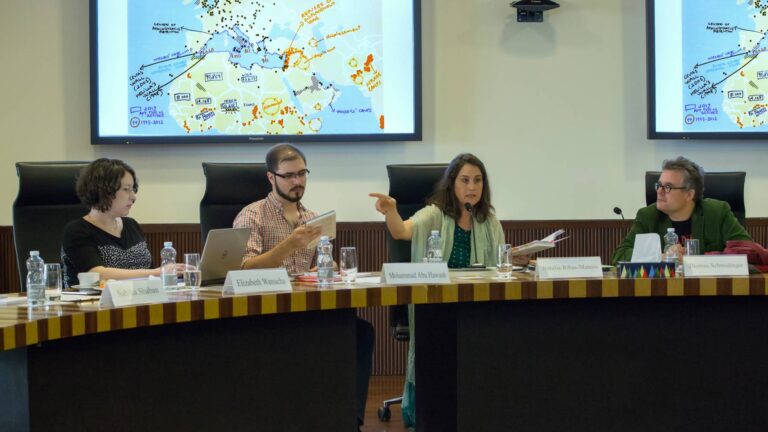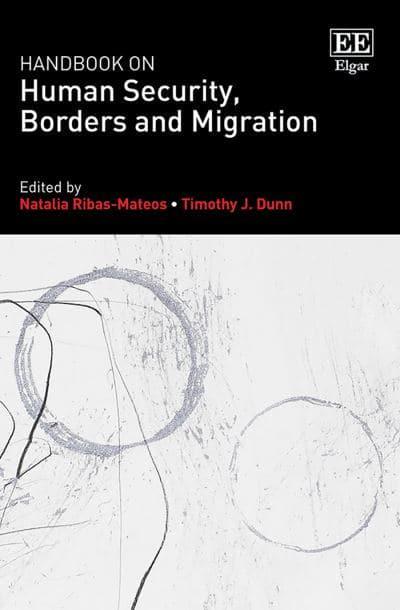Everyday Bordering - Book Launch: Human Security, Borders and Migration
Notes & Changes
This event will be in person and streamed on Youtube. To attend either way, please register here. The inscription closes on Tuesday 16th and links will be sent out on the same day of the talk. Please also note that this event may be recorded, with the exception of any live audience questions. The talk will be made available on the Law Faculty’s YouTube channel at a later date.
Join us for a talk on Everyday Bordering and the launch of the Handbook on Human Security, Borders and Migration with one of the editors Natalia Ribas-Mateos and the two contributors Saskia Sassen and Martin Lundsteen.
Copies of the book will be available for purchase at the event at a reduced price.

Robert S. Lynd Professor of Sociology at Columbia University and a Member of its Committee on Global Thought, which she chaired till 2015. She is a student of cities, immigration, and states in the world economy, with inequality, gendering and digitization three key variables running through her work. Born in the Netherlands, she grew up in Argentina and Italy, studied in France, was raised in five languages, and began her professional life in the United States. She is the author of eight books and the editor or co-editor of three books. Together, her authored books are translated into over twenty languages. She has received many awards and honours, among them multiple doctor honoris causa, the 2013 Principe de Asturias Prize in the Social Sciences, election to the Royal Academy of the Sciences of the Netherlands, and made a Chevalier de l'Ordre des Arts et Lettres by the French government. Saskia Sassen's research and writing focuses on globalization (including social, economic and political dimensions), immigration, global cities (including cities and terrorism), the new networked technologies, and changes within the liberal state that result from current transnational conditions. In her research she has focused on the unexpected and the counterintuitive as a way to cut through established "truths." In her most recent book, Expulsions: Brutality and Complexity in the Global Economy, Sassen draws surprising connections to illuminate the systemic logic of the expulsions from professional livelihood, from living space, even from the very biosphere that makes life possible. The sophisticated knowledge that created today's financial "instruments" is paralleled by the engineering expertise that enables exploitation of the environment, and by the legal expertise that allows the world's have-nations to acjanquire vast stretches of territory from the have-nots. Expulsions lays bare the extent to which the sheer complexity of the global economy makes it hard to trace lines of responsibility for the displacements, evictions, and eradications it produces - and equally hard for those who benefit from the system to feel responsible for its depredations.

Associated Researcher at the Universitat Autònoma de Barcelona (TRANSMENA Project) and (MESOPOLHIS UMR 7064) Aix-Marseille Université. She has taught in different Spanish and foreign universities and was twice a Marie Curie Fellow (UK-US and France) and also a Ramon y Cajal Fellow in Spain. She has published extensively in Spanish, French and Arabic. She edited with EE, Migration, Mobilities and the Arab Spring: Spaces of Refugee Flight in the Eastern Mediterranean (2016); As a single author in English Border Shifts: New Mobilities in Europe and Beyond (2015); and The Mediterranean in the Age of Globalization: Migration, Welfare, and Borders (2005). Other recent works include The International Handbook on Gender, Migration and Transnationalism (ed. with L. Oso, 2013, EE); and various collections of works related to age, gender and mobilities. She is now preparing a research handbook for EE on Global Migration and Gender, in co-edition with Saskia Sassen.

Carlsberg Foundation Visiting Fellow at the Centre for Criminology, and Carlsberg Junior Research Fellow at Linacre College. Martin is currently working on the project Contested Belongings: Emerging Bordering Practices in the EU. A research project funded by the Carlsberg Foundation that study how social boundaries are being constituted and enforced through housing in two European metropolises. The fieldwork consists of a 6-month comparative investigation of bordering practices in Denmark and Catalonia. He has authored several publications on subjects such as critical studies of race and ethnicity, Islamophobia and anti-Muslim racism, and migration and ‘super-diversity’ in relation to urban studies. And currently, he is publishing two forthcoming books, one with Rowman and Littlefield International in their series Challenging Migration Studies, titled: Convivencia. Urban Space and Migration in a Small Catalan Town, and another with Lexington Books titled: The Mosque Conflict in Catalonia. Space, Culture and Capitalism.

Edited by Natalia Ribas-Mateos, Universitat Autònoma de Barcelona, Spain and Timothy J. Dunn, Department of Sociology, Salisbury University, US
For more information here.
Drawing on the concept of the ‘politics of compassion’, this Handbook interrogates the political, geopolitical, social and anthropological processes which produce and govern borders and give rise to contemporary border violence.
Chapters map different aspects of structural violence and mobilities in some of the world’s most contentious border zones, highlighting the forms and practices that connect with labour exploitation, legal exclusion and a severe absence of human rights. International interdisciplinary contributors, including renowned sociologist Saskia Sassen, draw attention to the forms and spaces of resistance available to migrants and activists, contemplating how advocates attempt to provide protection and human security to those subjected to border violence. Offering empirical analyses of critical border spaces, the book covers extensively the US–Mexico border region and border zones around the Mediterranean. Border issues in South, Central and North America, Eastern Europe, Northern Europe, the Middle East, Central Africa and East and Central Asia are also discussed. The Handbook thus provides a truly transnational approach to borders and migration, demonstrating the dynamic but asymmetric relationship between the social structure of border enforcement and the human agency of migrants and global activists.
Combining theoretical insights into structural violence and human rights with key case studies of border zones, this comprehensive Handbook is crucial reading for scholars and researchers of social and political science investigating human migration, border control and human rights. Its practical insights will also benefit policy-makers involved in borders and migration, as well as advocates and NGOs working with migrants and refugees to create secure environments.



Project 2020: R+D Project “The Reconfiguration of Transnational Actors and Elites in the MENA Region. Historical Continuity or Twenty-First Century Change.”, directed by Dr Laura Feliu Martínez and Dr Ferran Izquierdo Brichs. (Spanish Ministry of Science, Innovation and Universities; State Agency for Research (AEI) and European Regional Development Fund (ERDF)) (HAR2016-77876-P).


